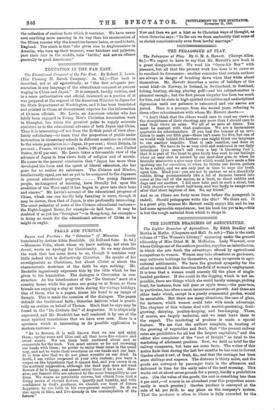PAGAN AND PURITAN.
Pagan and Puritan : the " Octatius" of Minucius. Freely translated by Arthur Aikin Brodribb. (G. Bell and Sons. 3s. ed.) —Minucius Felix, about whom we know nothing, not even his floruit, wrote an Apology for Christianity. So we may describe the work that has come down to us, though it contains very little indeed that is distinctively Christian. He speaks of his co-religionists as Christians, but about Christ or about the characteristic doctrines of the faith he says nothing. Mr. Brodribb ingeniously expresses this by the title which he has given to his translation. The dialogue is Ciceronian in con- struction. As the interlocutors of the "De Oratore" meet at a country house while the games are going on at Rome, so three friends are enjoying a stay at Ostia during the vintage holidays. One of them, who is a pagan, kisses his hand to an image of Serapis. This is made the occasion of the dialogue. The pagan defends the traditional faith ; Octavius delivers what is practi- cally an oration on behalf of Theism. Much that he says may be found in the "Do Civitate Del" of Augustine. It is eloquently expressed, and Mr. Brodribb has well rendered it by one of the most spirited translations that we have ever seen. Here is a specimen which is interesting in its possible application to modern customs :—
" As to flowers, it is well known that we use and enjoy them ; spring roses and lilies and all that have fine colours and sweet scents. We use them both scattered about and as ornaments for the neck. You must excuse us for not crowning our heads with them ; we prefer to enjoy their scent in the usual way, and not to waste their sweetness on our heads and our hair. It is true also that we do not place wreaths on our dead. In truth, I am rather surprised at your own custom; you burn a corpse on the hypothesis that it cannot feel, and you crown it on the contrary supposition, although the dead man does not want flowers if he is happy, and cannot enjoy them if he is not. How- ever, our funeral rites are adorned by the same tranquillity as our lives. We weave no perishable crowns, but obtain from God a living crown of eternal flowers. Quietly and humbly, and with confidence in God's goodness, we cherish our hope of future happinews by our faith in his ever-present majesty. So do we rise again in bliss, and live already in the contemplation of the future." Now and then we get a hint as to Christian ways of thought, as when Octavius says : "So far are we from unchastity that some of us shrink conscientiously even from lawful marriage."


























































 Previous page
Previous page